How To Register To Vote In Mn As A College Student
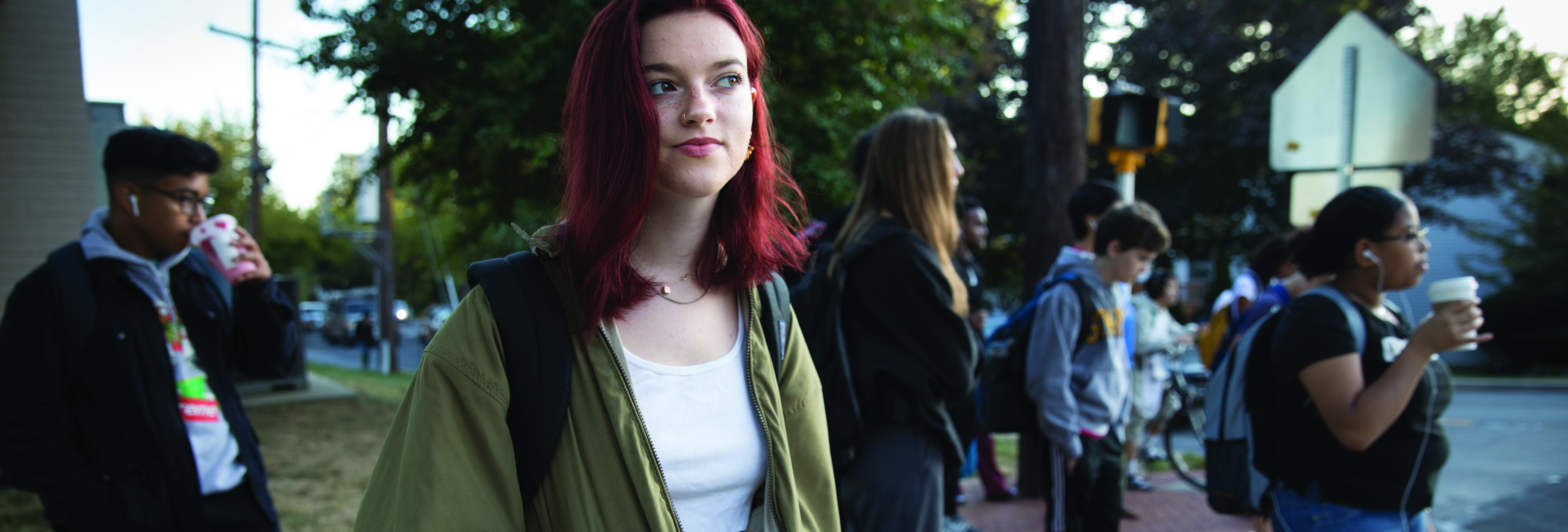
On the Cusp of Adulthood and Facing an Uncertain Future: What We Know Most Gen Z And so Far
One-in-ten eligible voters in the 2020 electorate volition be part of a new generation of Americans – Generation Z. Built-in afterward 1996, nigh members of this generation are not yet one-time enough to vote, but as the oldest amongst them plow 23 this year, roughly 24 million will have the opportunity to cast a election in November. And their political ascendancy volition go along to abound steadily in the coming years, as more than and more of them reach voting age.
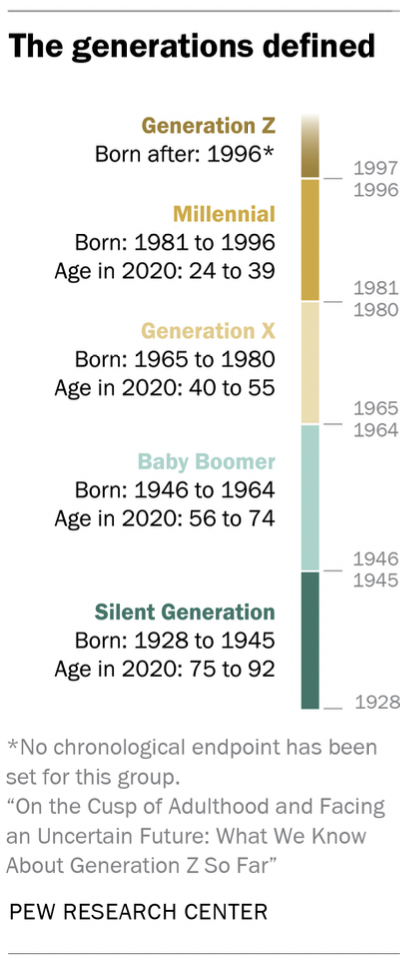
Different the Millennials – who came of age during the Bully Recession – this new generation was in line to inherit a stiff economy with record-low unemployment. That has all changed now, as COVID-xix has reshaped the country's social, political and economic landscape. Instead of looking ahead to a world of opportunities, Gen Z now peers into an uncertain future.
There are already signs that the oldest Gen Zers take been particularly hard striking in the early weeks and months of the coronavirus crunch. In a March 2020 Pew Enquiry Center survey, one-half of the oldest Gen Zers (ages 18 to 23) reported that they or someone in their household had lost a job or taken a cut in pay because of the outbreak. This was significantly college than the shares of Millennials (40%), Gen Xers (36%) and Baby Boomers (25%) who said the same. In add-on, an assay of jobs information showed that immature workers were particularly vulnerable to job loss before the coronavirus outbreak, equally they were overrepresented in high-risk service sector industries.
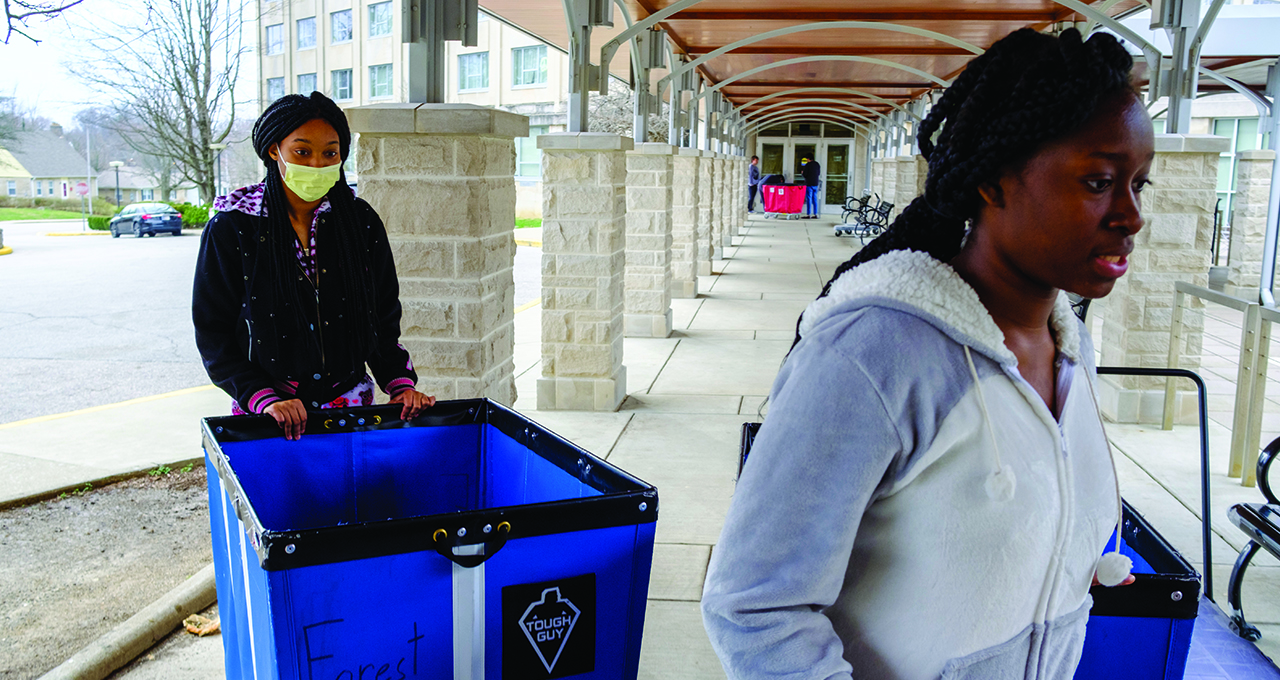
Aside from the unique set of circumstances in which Gen Z is approaching adulthood, what practice we know nearly this new generation? We know information technology's different from previous generations in some important ways, but like in many ways to the Millennial generation that came before it. Members of Gen Z are more than racially and ethnically diverse than any previous generation, and they are on rails to exist the almost well-educated generation withal. They are also digital natives who accept fiddling or no retentivity of the world equally it existed earlier smartphones.
Even so, when information technology comes to their views on key social and policy bug, they look very much like Millennials. Pew Inquiry Heart surveys conducted in the autumn of 2018 (more than a year before the coronavirus outbreak) among Americans ages 13 and older plant that, similar to Millennials, Gen Zers are progressive and pro-government, almost see the state's growing racial and ethnic diversity as a good thing, and they're less likely than older generations to see the United States every bit superior to other nations.1
A look at how Gen Z voters view the Trump presidency provides further insight into their political behavior. A Pew Enquiry Center survey conducted in January of this year found that about a quarter of registered voters ages 18 to 23 (22%) approved of how Donald Trump is treatment his job every bit president, while about iii-quarters disapproved (77%). Millennial voters were only slightly more likely to approve of Trump (32%) while 42% of Gen X voters, 48% of Babe Boomers and 57% of those in the Silent Generation approved of the job he's doing as president.
Gen Z is more racially and ethnically diverse than previous generations
Generation Z represents the leading edge of the country's irresolute racial and ethnic makeup. A bare bulk (52%) are not-Hispanic white – significantly smaller than the share of Millennials who were not-Hispanic white in 2002 (61%). One-in-four Gen Zers are Hispanic, 14% are black, 6% are Asian and 5% are some other race or ii or more races.
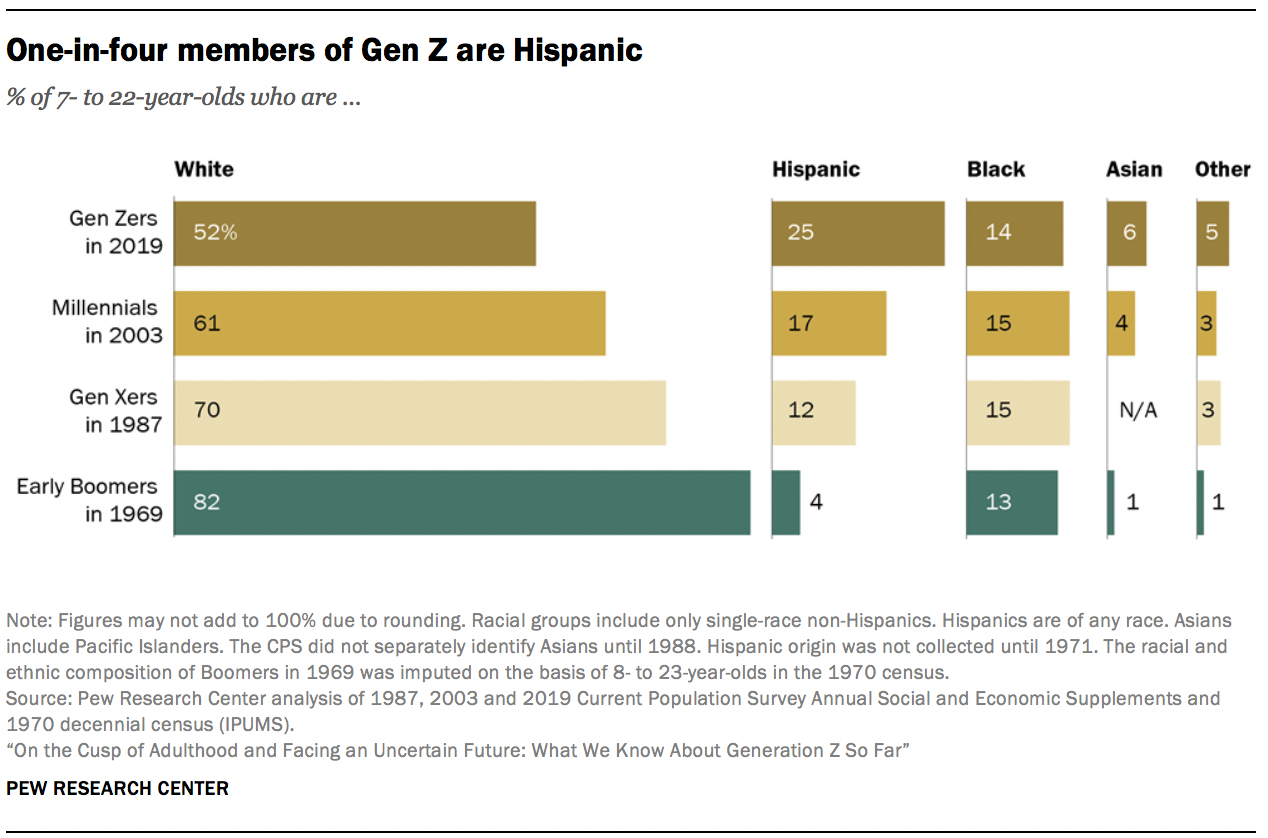
Gen Zers are slightly less probable than Millennials to exist immigrants: 6% were built-in outside of the U.S., compared with seven% of Millennials at the same historic period. But they are more than likely to be the children of immigrants: 22% of Gen Zers accept at least 1 immigrant parent (compared with fourteen% of Millennials). Fifty-fifty equally immigration flows into the U.S. have diminished in contempo years, new immigrants will bring together the ranks of Gen Z in the years to come. As a event, this generation is projected to become majority nonwhite by 2026, according to Census Agency projections.
In some regions of the U.S., Gen Z has already crossed this threshold. In the Due west, simply 40% of Gen Zers are non-Hispanic white. But as many are Hispanic, while four% are blackness, 10% are Asian and 6% are some other race. In the S, 46% of Gen Zers are non-Hispanic white. Minority representation is lowest in the Midwest, where more than two-thirds of Gen Zers (68%) are non-Hispanic white.
Gen Z on track to be the best-educated generation yet
A look at older members of Generation Z suggests they are on a somewhat unlike educational trajectory than the generations that came before them. They are less likely to driblet out of high schoolhouse and more than likely to exist enrolled in higher. Amongst 18- to 21-year-olds no longer in loftier schoolhouse in 2018, 57% were enrolled in a two-yr or four-twelvemonth higher. This compares with 52% among Millennials in 2003 and 43% among members of Gen X in 1987.
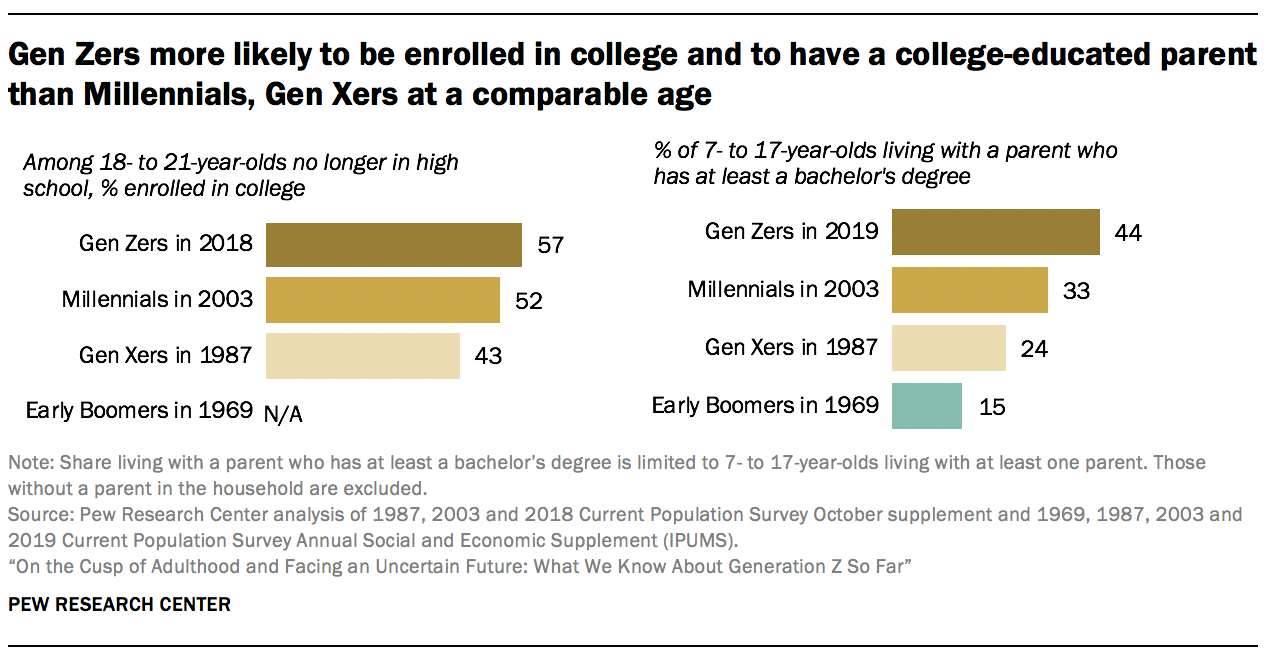
These changing educational patterns are tied to changes in clearing peculiarly amid Hispanics. Gen Z Hispanics are less likely than Millennial Hispanics to exist immigrants, and previous enquiry has shown that second-generation Hispanic youth are less likely to drib out of loftier school and more likely to attend college than foreign-born Hispanic youth.
Gen Zers are also more than likely to have a college-educated parent than are previous generations of young people. In 2019, 44% of Gen Zers ages 7 to 17 were living with a parent who had a bachelor's degree or more than educational activity, compared with 33% of Millennials when they were the aforementioned age. Both of these trends reflect the overall tendency toward more Americans pursuing higher education.
Perchance considering they are more than probable to be engaged in educational endeavors, Gen Zers are less likely to exist working than previous generations when they were teens and young adults. Only 18% of Gen Z teens (ages 15 to 17) were employed in 2018, compared with 27% of Millennial teens in 2002 and 41% of Gen Xers in 1986. And among young adults ages eighteen to 22, while 62% of Gen Zers were employed in 2018, higher shares of Millennials (71%) and Gen Xers (79%) were working when they were a comparable age.

Gen Zers and Millennials have similar viewpoints on many major issues of the 24-hour interval
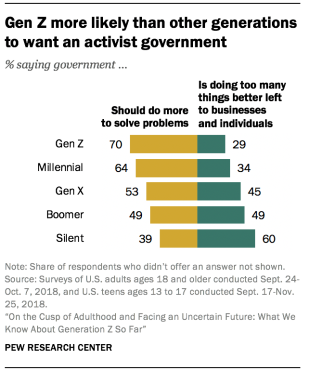
The views of Gen Z mirror those of Millennials in many ways. Still, survey data collected in 2018 (well earlier the coronavirus outbreak) shows that at that place are places where this younger generation stands out every bit having a somewhat dissimilar outlook.
For example, members of Gen Z are more than likely than older generations to look to government to solve issues, rather than businesses and individuals. Fully seven-in-ten Gen Zers say the government should practise more to solve problems, while 29% say government is doing too many things better left to businesses and individuals. A somewhat smaller share of Millennials (64%) say government should do more than to solve problems, and this view is fifty-fifty less prevalent amid older generations (53% of Gen Xers, 49% of Boomers and 39% of Silents).
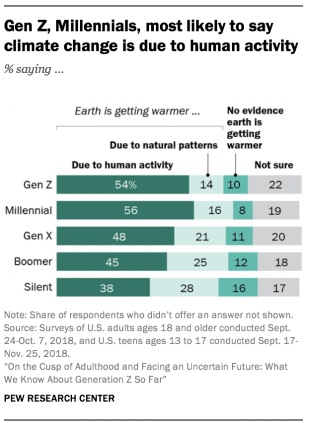
For the nigh role, nevertheless, Gen Zers and Millennials share similar views on issues facing the country. These younger generations are more likely than their older counterparts to say the globe is getting warmer due to human activity: 54% of Gen Z and 56% of Millennials say this, compared with smaller shares of Gen Xers, Boomers and Silents (48%, 45% and 38%, respectively).
When information technology comes to race relations, Gen Zers and Millennials are about as probable to say that blacks are treated less adequately than whites in this country. Roughly two-thirds of Gen Zers and Millennials say this, compared with about half of Gen Xers and Boomers and smaller shares among the Silent Generation.
Younger generations too share a unlike view of the U.S. relative to other countries in the world. Gen Zers (fourteen%) and Millennials (13%) are less likely than Gen Xers (20%), Boomers (xxx%) or Silents (45%) to say the U.S. is improve thanall other countries. Still, pluralities of every generation except the Silent Generation say the U.S. is 1 of the best countries in the world along with some others.
Within the GOP, Gen Zers take sharp differences with their elders
Amidst Republicans and those who lean to the Republican Party, there are striking differences between Generation Z and older generations on social and political issues. In their views on race, Gen Z Republicans are more probable than older generations of Republicans to say blacks are treated less adequately than whites in the U.S. today. Fully 43% of Republican Gen Zers say this, compared with xxx% of Millennial Republicans and roughly two-in-ten Gen 10, Boomer and Silent Generation Republicans. Views are much more consistent beyond generations among Democrats and Democratic leaners.
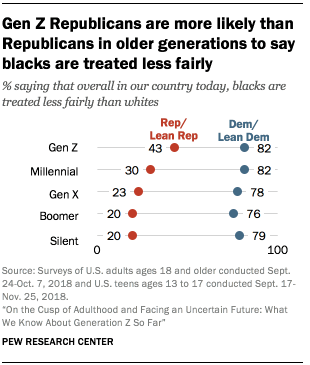
Similarly, the youngest Republicans stand up out in their views on the function of authorities and the causes of climate change. Gen Z Republicans are much more probable than older generations of Republicans to want an increased government part in solving problems. About half (52%) of Republican Gen Zers say government should do more than, compared with 38% of Millennials, 29% of Gen Xers and even smaller shares among older generations. And the youngest Republicans are less likely than their older counterparts to attribute the earth's warming temperatures to natural patterns, as opposed to human activity (18% of Gen Z Republicans say this, compared with three-in-ten or more amidst older generations of Republicans).
Overall, members of Gen Z look like to Millennials in their political preferences, peculiarly when it comes to the upcoming 2020 election. Among registered voters, a Jan Pew Research Middle survey found that 61% of Gen Z voters (ages 18 to 23) said they were definitely or probably going to vote for the Autonomous candidate for president in the 2020 election, while about a quarter (22%) said they were planning to vote for Trump. Millennial voters, similarly, were much more likely to say they plan to support a Democrat in November than Trump (58% vs. 25%). Larger shares of Gen X voters (37%), Boomers (44%) and Silents (53%) said they plan to support President Trump.

Younger generations see family unit, societal change as a good thing
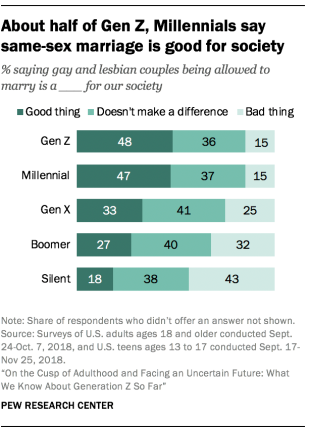
Across a number of measures, Gen Zers and Millennials stand out from older generations in their views of family unit and societal modify. Roughly half of Gen Zers (48%) and Millennials (47%) say gay and lesbian couples beingness allowed to ally is a good matter for our society. Past comparison, but 1-third of Gen Xers and near one-quarter of Boomers (27%) say this is a skillful thing. Pluralities of Boomers and Gen Xers say it doesn't make a difference. Members of the Silent Generation are the virtually likely to view this as a bad affair for social club.
In that location is a similar blueprint in views of people of different races marrying each other, with larger shares of Millennials and Gen Zers saying this is a skillful thing for our guild, compared with older generations. Very few across generations say this is a bad matter for society.
Gen Zers and Millennials are less likely than older generations to say that single women raising children on their own is a bad thing for society. Yet, relatively few in both generations say this is a good thing for society, while about one-half say it doesn't make much departure (roughly similar to the shares among older generations).
When it comes to their own home life, the experiences of Gen Z reflect, in part, broad trends that have reshaped the American family in recent decades. According to a Pew Research Center analysis of Census Bureau information, about three-in-ten (29%) live in a household with an single parent while 66% live with two married parents. A roughly comparable share of Millennials (69%) lived with two married parents at a similar age, simply the shares amidst Gen Xers and Boomers were significantly larger (72% and 86%). Of those Gen Zers who are living with two married parents, in virtually cases both of those parents are in the labor force (64%). This compares with a slightly higher share of Millennials who were living with 2 parents at a comparable age (66% had two parents in the labor force) and a slightly lower share of Gen Xers (61%).
Generations differ in their familiarity and comfort with using gender-neutral pronouns
Ideas about gender identity are rapidly changing in the U.S., and Gen Z is at the front end end of those changes. Gen Zers are much more than probable than those in older generations to say they personally know someone who prefers to get by gender-neutral pronouns, with 35% saying so, compared with 25% of Millennials, 16% of Gen Xers, 12% of Boomers and only vii% of Silents. This generational pattern is axiomatic among both Democrats and Republicans.
At that place are also stark generational differences in views of how gender options are presented on official documents. Gen Z is past far the almost likely to say that when a form or online profile asks about a person's gender information technology should include options other than "man" and "woman." About six-in-ten Gen Zers (59%) say forms or online profiles should include additional gender options, compared with one-half of Millennials, about four-in-x Gen Xers and Boomers (40% and 37%, respectively) and roughly a tertiary of those in the Silent Generation (32%).
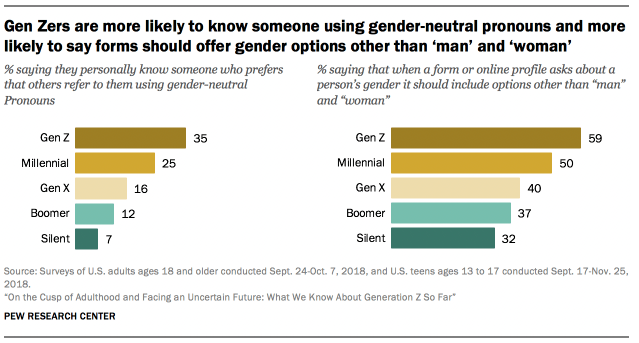
These views vary widely along partisan lines, and in that location are generational differences within each party coalition. But those differences are sharpest among Republicans: About four-in-10 Republican Gen Zers (41%) think forms should include additional gender options, compared with 27% of Republican Millennials, 17% of Gen Xers and Boomers and 16% of Silents. Among Democrats, half or more in all generations say this.
Gen Zers are similar to Millennials in their comfort with using gender-neutral pronouns. Both groups express somewhat higher levels of comfort than other generations, though generational differences on this question are fairly modest. Majorities of Gen Zers and Millennials say they would experience "very" or "somewhat" comfortable using a gender-neutral pronoun to refer to someone if asked to do so. By comparison, Gen Xers and Boomers are about evenly divided: About as many say they would experience at to the lowest degree somewhat comfy (49% and 50%, respectively) as say they would be uncomfortable.
Members of Gen Z are also similar to Millennials in their views on order's acceptance of those who do not identify as a homo or a woman. Roughly one-half of Gen Zers (l%) and Millennials (47%) think that social club is non accepting plenty of these individuals. Smaller shares of Gen Xers (39%), Boomers (36%) and those in the Silent Generation (32%) say the same.
Here again at that place are large partisan gaps, and Gen Z Republicans stand apart from other generations of Republicans in their views. About iii-in-ten Republican Gen Zers (28%) say that society is not accepting plenty of people who don't identify as a human or woman, compared with two-in-ten Millennials, fifteen% of Gen Xers, 13% of Boomers and 11% of Silents. Democrats' views are about uniform across generations in proverb that society is non accepting enough of people who don't identify equally a man or a woman.
Teens and technology

Looking at the human relationship American teens have with technology provides a window into the experiences of a meaning segment of Generation Z. According to a 2018 Pew Research Center survey, 95% of 13- to 17-yr-olds have access to a smartphone, and a similar share (97%) apply at to the lowest degree one of seven major online platforms.
YouTube, Instagram and Snapchat are among teens' favorite online destinations. Some 85% say they utilise YouTube, 72% use Instagram and 69% employ Snapchat. Facebook is less popular with teens – 51% say they use this social media site. Some 45% of teens say they are online "almost constantly," and an additional 44% say they're online several times a solar day.
Some researchers take suggested that the growing corporeality of time teens are spending on their mobile devices, and specifically on social media, is contributing to the growth in anxiety and depression among this grouping. Teens have mixed views on whether social media has had a positive or negative issue on their generation. Almost iii-in-10 (31%) say the effect on people their own historic period has been mostly positive, 24% say information technology's been mostly negative, and 45% say it'southward been neither positive nor negative.
Many teens who say social media has had a positive consequence say a major reason they experience this fashion is considering it helps them stay continued with friends and family (40% of teens who say social media has a generally positive effect say this). For those who meet the result of social media equally negative, the most common reason cited is that information technology leads to bullying and rumor spreading (27% of teens who say social media has a more often than not negative effect say this).
Source: https://www.pewresearch.org/social-trends/2020/05/14/on-the-cusp-of-adulthood-and-facing-an-uncertain-future-what-we-know-about-gen-z-so-far-2/
Posted by: welchtunised.blogspot.com


0 Response to "How To Register To Vote In Mn As A College Student"
Post a Comment